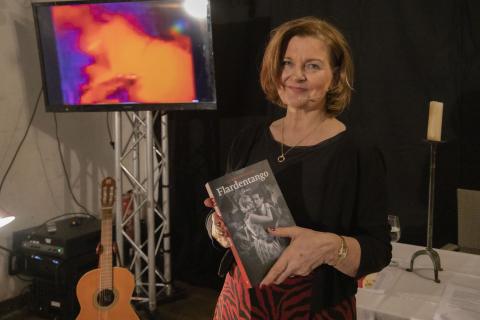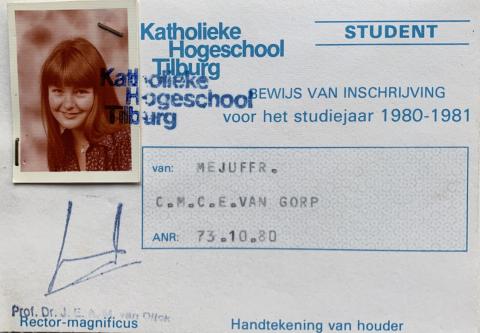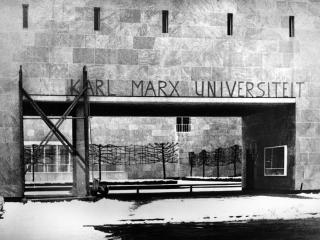An intriguing novel about memories and truth
Claire Brentjens (1959) studied Law in Tilburg. Between 1969 and 1972, she lived in Argentina as an expat child. Claire incorporated her experiences from that period in her debut novel Flardentango [Fragmentango]. Her time as a Tilburg student also features in the novel. Still, she does not want to refer to her book as an autobiography. ‘I prefer to call Flardentango a psychological novel because the emphasis is on the inner life of the characters and their interrelationships.’
How did the Master of Laws turn into a novelist?
I used to write columns for a magazine and these texts were very well-received. In my spare time, I started to focus on writing fiction and decided to do a four-year part-time program at the Schrijversacademie [Writers Academy] in Antwerp. In 2015, I graduated with Flardentango as my final assignment. According to the jury, it was a well-written family chronicle that needed a little more ‘pain and drama’. So after three years of rewriting, deleting, and polishing, my novel Flardentango emerged.

On November 16 2019, the novel was presented at Sociëteit T.S.C. Sint Olof.
What is the book about?
Flardentango is a novel about an expat family. The main character is Evelien, a nine-year-old who moves to Buenos Aires with her parents in 1969. Her brother and sister remain behind in a Dutch boarding school. This dramatic separation of parents and children has a great impact on the family.
When Evelien is 50 and lives in Belgium, she has fond memories of her childhood, but she also has questions about her past: why was the subject of Argentina never discussed at home, not even when a military regime came to power that would make tens of thousands of people disappear? And why did her parents suddenly return at the time? Evelien searches for answers, which triggers a fragmented tidal wave of less fond memories. She finds out that her parents have been keeping secrets from her, but she also discovers that there is a secret hidden within herself.
The different perspectives enhance the search into the past by the main character, Evelien. Her inner struggle makes the reader curious. What is the truth and what memories merely reflect a truth that is hers only?
To what extent is the book autobiographical?
Many facts from Evelien’s life correspond to my own: as a child, I used to live in Argentina, too, I also studied Dutch Law in Tilburg and now live in Belgium. I prefer to write about a situation I am familiar with. My years as an expat child in Argentina contain enough dramatic moments to write about. But the fact that I use personal sources does not necessarily make the novel autobiographical. I have transformed reality into fiction. In the writing process, events, characters and their relationships have always served the purpose of the story. If it was necessary for character development or to create tension, I altered real-life events. You could call my novel autofiction or historical fiction. What’s in a name? I prefer to call Flardentango a psychological novel, because the emphasis is on the characters’ inner life and their interrelationships.
What did you put in your book about Tilburg and Tilburg University?
In the book, I refer to the university’s history. Evelien discovers that, in the late 1960s, Tilburg students were the first in the Netherlands to campaign for more control over the management of their university. They painted ‘Karl Marx University’ on the university’s facade with red primer and barricaded campus buildings a few months later. They were trailblazers for students in other student cities.
Student association Sint Olof also features in the book. I used to be a member. In the Senat of 1981 and 1982 I was Abactis (secretary) and I co-founded the women’s debating society ‘Alea Iacta’. It still flourishes. In my time in Tilburg, my name was Marie-Claire van Gorp, by the way.
And the city of Tilburg plays a large role in the book. Like the main character’s grandfather, my granddad died on the day the city was liberated, 75 years ago in October 2019. This made Mayor Theo Weterings decide to be present when Flardentango was launched on November 16, 2019, at T.S.C. Sint Olof.

University Card of Marie-Claire van Gorp, as Claire was called in her Tilburg days.
To what extent have your law studies in Tilburg affected you as a writer?
I don’t know whether this is still the case, but especially at the beginning of my studies, examinations involved a lot of writing. In preparation, I mainly used to practice carefully formulating the answers. Writers, like lawyers, have to work analytically: distinguishing between important points and side issues, coming the point reasonably quickly, keeping an overview, and linking things. As part of my studies, I honed these analytical skills, which were ultimately very helpful in writing a novel.
What did life as an expat teach you?
Former expat children will often answer that their stay abroad has enriched their lives. It makes you more independent, you see a lot of the world, and, when you’re grown up, you can adapt anywhere, as I do now in Belgium. Still, it should not be underestimated what it means not to be able to put down roots. In my youth, I lived in thirteen different places, and went to three primary and three secondary schools. Because I was a student in a period when was still possible to spend years and years studying, Tilburg feels most like home to me when I am in the Netherlands.
Trailer Flardentango
Also in Tilburg University Magazine
Date of publication: 11 February 2020



